This NGO is dissolving the walls of a classroom and changing the way kids learn science
DoScience! centres allow children to discover and explore science. Children now have the chance to step out and experience science where it really exists–outside the four walls of a classroom.
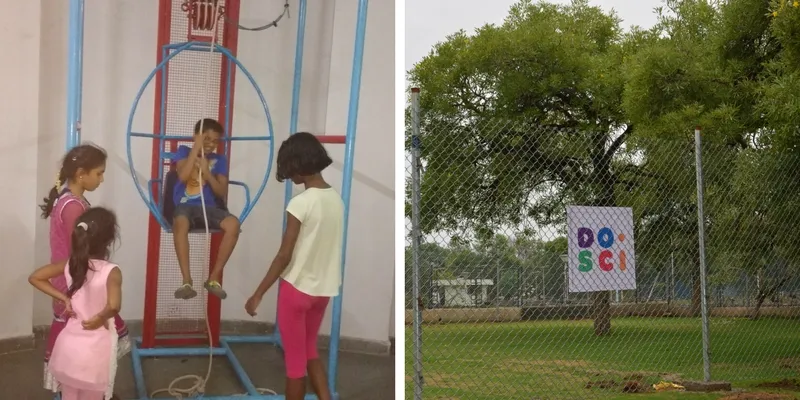
Today’s education system has forced kids to limit their learning to the boundaries of the classrooms. Many fail to think and perceive things beyond their set curriculums and textbooks.
In times like these, there is the need of free and open learning centres for kids to discover and explore things on their own. The team at Bookmark Projects has come up with the idea of creating free learning spaces for children where they can discover and explore science.
Do Science!
In October 2016, Bookmark Projects was set up as a not-for-profit organisation (Trust) in Hyderabad, with the aim to take science learning outside of schools, and shift the goals from marks and grades, to sparking off a spirit of curiosity and innovation among children.
The founders believe that science holds the key to the most critical problems of the world– from poverty to climate change; and by ‘doing science’ without the rigid structures of classrooms and examinations, children will unearth the unlimited joys of exploring, questioning, analysing, and innovating.
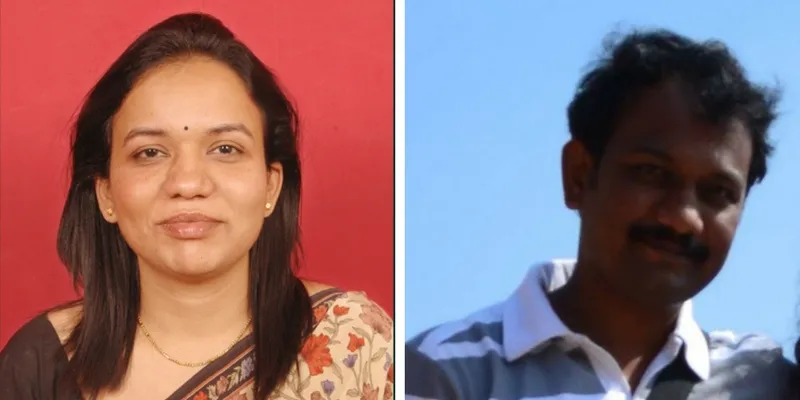
Aparna Vishwananthan, managing trustee and founding member of Bookmark Projects, says,
Looking back at our own schooling, we realised how little we appreciated the wonders of science and how, unfortunately, most schools in India continued to be limited by their rigid curriculums and examination systems. We figured that we needed to take science learning outside of schools, and shift the goals from marks and grades, to sparking off a spirit of curiosity and innovation among children.
The team members at Bookmark Projects draw inspiration from their experiences of working in low-income communities of India. The team consists of Aparna, Akhil Vishwanatham, and Sowmya Achar. While Sowmya is an IRS professional, Aparna and Akhil are IIM graduates, who now hold corporate jobs.
Keeping ‘science without restrictions and inhibitions’ as the primary goal, we developed a robust, sustainable model for setting up and running hands-on science centres in public spaces. We chose to locate the centres in community spaces, so that low and middle-income families are easily able to access them.
What started as a spark of an idea two years back, took concrete shape over the past year, and the first DoScience! centre will commence operations in July 2017, says Aparna.
The team believes that such science centres will not only ignite curiosity in children, but also improve the scientific literacy of the local community.
The centres
After building a framework for the science centres, the team pitched the idea of setting up five DoScience! centres in public parks in Hyderabad to the Commissioner, Hyderabad Metropolitan Development Authority (HMDA), who approved it.
The team was selected from the pool of bidders, and signed a five-year lease agreement with HMDA for a 5,000 sqft of open area in the centrally located Sanjeevaiah Park. In the meantime, the team worked with the Birla Science Centre for identifying the exhibits to be installed in the centre.
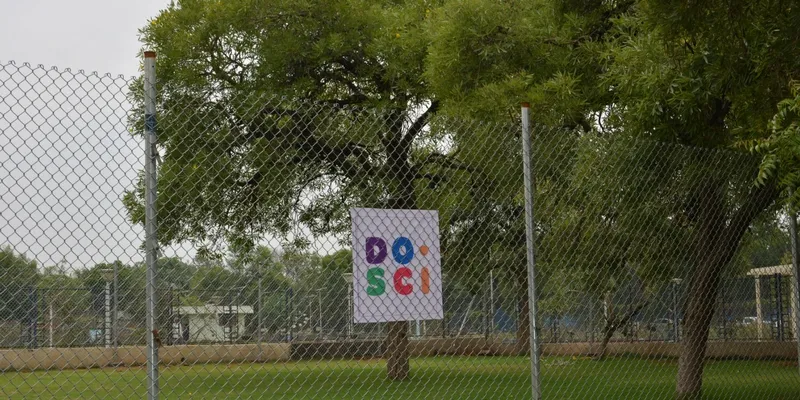
The team has identified around 30 exhibits for installation, covering the domains of mechanics, optics, and sound. Some of the exhibits were selected from the existing product portfolio of the Birla Science team, and some were drawn from museums around the world.
We realised during our research that science exhibits fabricated in India are almost entirely focussed on functionality, durability, and safety. However, there is no focus on user experience–‘will children enjoy playing with them?’ is a rarely asked question.
So, the team worked on improving the user experience of the exhibits and also of the space. They created a design team to work specifically with this objective.
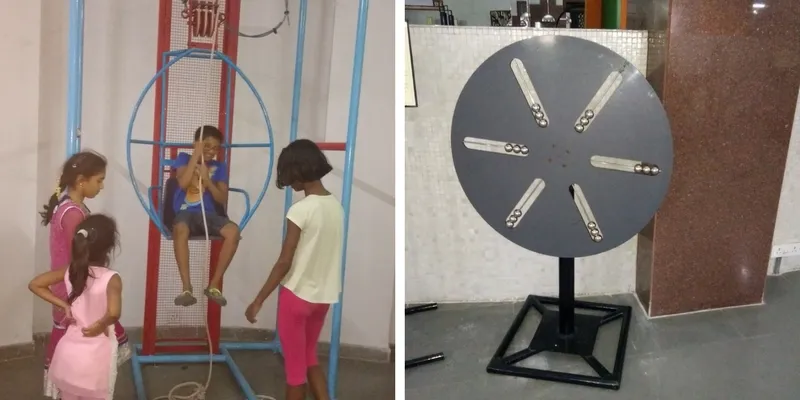
Some of the exhibits at DoScience! include a Bosun’s chair, in which the child can pull herself up through a pulley mechanism. This introduces the concept of mechanical advantage in an extremely engaging and fun way.
Another interesting exhibit is the square wheeled cycle, which makes a child realise that one does not need a circular wheel for a smooth ride. By building a surface that ensures that the axle of the wheel is always at a constant distance from the ground surface, it demonstrates that wheels of all shapes can give smooth rides.
Plans in motion
Over the first five years of operations of the first DoScience! centre, the team hopes to provide a substantive science learning experience to around 3 lakh paying visitors. While entry is free for government schools, private schools will be charged a minimal fee of Rs 50 per head.
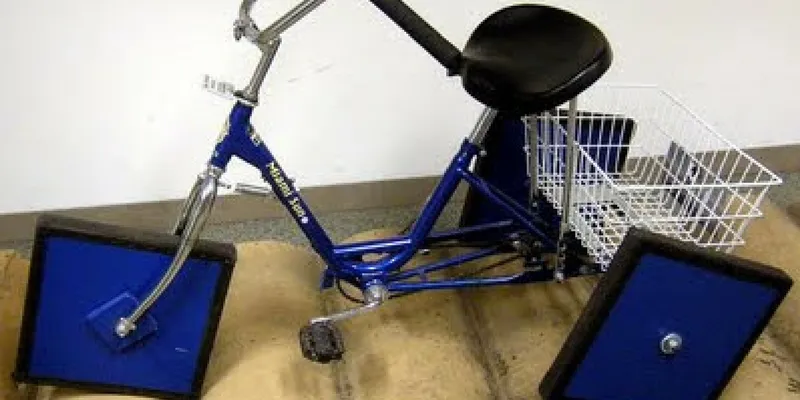
The total cost of the project is Rs 70 lakh, of which around Rs 60 lakh is for capital expenditure and set-up cost. The founding team and other volunteers are working on a pro-bono basis, in addition to donating monetarily. The operating expenses for the project are mostly on account of the lease rental to HMDA and salaries of the team managing the centre.
DoScience! recently conducted a crowdfunding campaign to raise funds for setting up centres in Hyderabad.
“We expect the centre to be self-sustainable after one year of operations–apart from the initial capital expenditure, the DoScience! centre will not need any additional support subsequently,” says Aparna, confidently.










![[Funding alert] Data security startup Seclore raises $27M; VenturEast exits with 17.5X return](https://images.yourstory.com/cs/2/11718bd02d6d11e9aa979329348d4c3e/funding-1645511711142.jpg?mode=crop&crop=faces&ar=1%3A1&format=auto&w=3840&q=75)
![[Funding alert] Maths learning app Countingwell raises Pre-Series A round](https://images.yourstory.com/cs/2/11718bd02d6d11e9aa979329348d4c3e/Imagewf2p-1607509774638.jpg?mode=crop&crop=faces&ar=1%3A1&format=auto&w=3840&q=75)